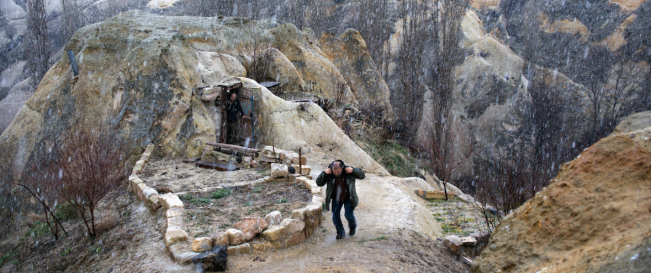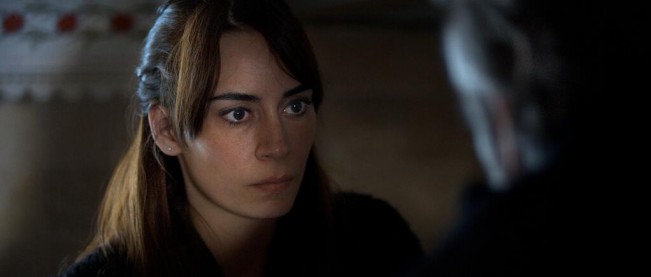By Jake Howell jake.howell@utoronto.ca
Countdown To Cannes: Nuri Bilge Ceylan
The sixth in a series of snapshots outlining the nineteen directors in the 67th Palme d’Or Competition.
Background: Turkish; born in Istanbul, Turkey, 1959.
Known for / style: Kasaba (Small Town, 1997), Üç Maymun (Three Monkeys, 2008), Bir Zamanlar Anadolu’da (Once Upon a Time in Anatolia, 2011); extended takes with little-to-no camera movement; sprawling runtimes; scenes of deafening silence; wide or distanced shots of landscapes; domestic dramas cast with non-actors or family members; accomplished photography and screenwriting in addition to directing.
Notable accolades: Throughout his two decades or so on the festival circuit, Ceylan (approximately pronounced “dzjay-lan”) has nearly won it all. At Cannes, he’s taken home the Grand Jury Prize twice (Uzak, 2002; Once Upon a Time in Anatolia, 2011) and the Festival’s prestigious Best Director award in 2008 (Three Monkeys). At Berlin, he won the Caligari Film Award in 2008 for Small Town. He’s also a seven-time FIPRESCI Award winner from multiple festivals, a veritable hero at his local Istanbul International Film Festival, and a two-time winner of the Asia Pacific Screen Awards Achievement in Direction prize (Anatolia and Three Monkeys).
Previous Cannes appearances: Since his Competition debut in 2002 (Uzak), Ceylan has reserved his world premieres for Cannes, with Climates, Three Monkeys and Anatolia following in the same pattern. His 1995 short film Koza played in the short film Competition, and he is a two-time Jury veteran (Competition member, 2009; Cinéfondation member, 2004). In other words, 2014 will mark his fifth shot at a feature-length Palme d’Or.
Film he’s bringing to Cannes: Kış Uykusu or Winter Sleep, which may or may not refer to the film’s intimidating 196-minute run-time. “Winter Sleep is about humans,” Ceylan said in an interview with Sony’s technical side. “It’s a drama set in the middle of Turkey, in Anatolia. We captured many kinds of images on location, shooting in Cappadocia over wintertime. There are many kinds of landscapes, human-scapes and portraits, sometimes in snow, sometimes in cloudy weather and more seldomly sunny images as well.” The newly-released trailer shows Turkish actor Haluk Bilginer struggling with domestic married life.
 Could it win the Palme? Ceylan is essentially three for four in his Cannes career. Given that the auteur’s style is tailor-made for the Palme’s proclivities, you could bet that Ceylan may be a candidate for serious awards consideration. A full-out win at this point seems almost too obvious, so we’ll have to wait (and wait) to see. That said, do not be surprised if 2014 marks Turkey’s second Palme d’Or win, after Yılmaz Güney and Şerif Gören’s golden The Way (1982).
Could it win the Palme? Ceylan is essentially three for four in his Cannes career. Given that the auteur’s style is tailor-made for the Palme’s proclivities, you could bet that Ceylan may be a candidate for serious awards consideration. A full-out win at this point seems almost too obvious, so we’ll have to wait (and wait) to see. That said, do not be surprised if 2014 marks Turkey’s second Palme d’Or win, after Yılmaz Güney and Şerif Gören’s golden The Way (1982).
Why you should care: Ceylan has helped place Turkish cinema on the international radar. It might prove difficult to get excited about a drama that’s longer than a Lord of the Rings entry, but Ceylan’s gorgeous location photography, careful consideration of pacing, and his intriguing human story should more than justify its running time. Ceylan’s masterful style is his own.
Follow Jake Howell on Twitter: @Jake_Howell
Previous Entries:
Tommy Lee Jones
Atom Egoyan
Bennett Miller
Xavier Dolan
David Cronenberg

















Ugh. Ceylan is a horrible, pretentious director, whose movies are beyond boring. When will Cannes finally see that the emperor has no clothes? I saw his film, Three Monkeys, knowing nothing about it, and thought it was one of the worst films I’d ever seen – the plot outline was interesting, but all I remember is that nothing that happened in the film was related to that. He’s dreadful.
Oh, boo.